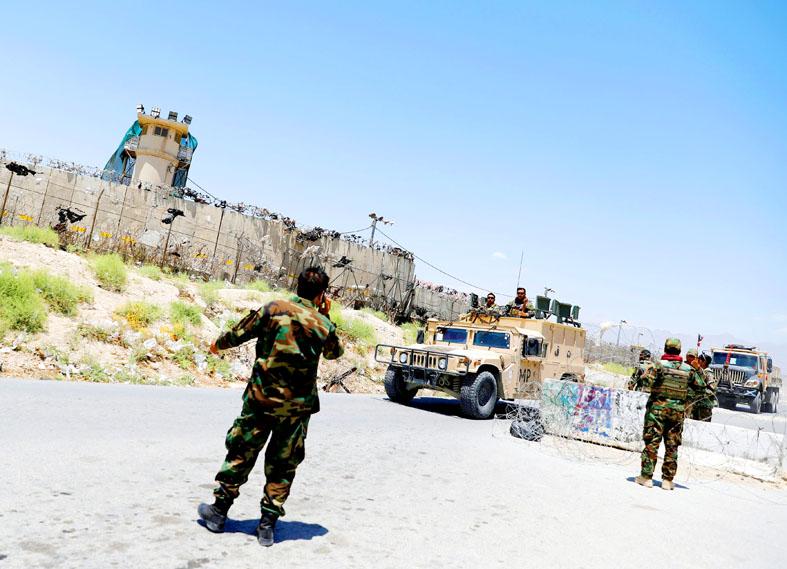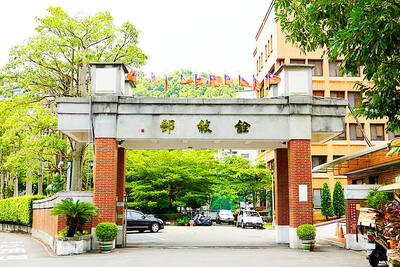All US and NATO troops have left the biggest air base in Afghanistan, officials said yesterday, signaling that the complete withdrawal of foreign forces from the country was imminent after two decades of war.
Bagram Air Base served as the linchpin for US-led operations in the rugged country, where the long war against the Taliban and their al-Qaeda allies started following the Sept. 11, 2001, attacks.
“The American and coalition forces have completely withdrawn from the base and henceforth the Afghan army forces will protect it and use it to combat terrorism,” Afghan Ministry of Defense spokesman Fawad Aman wrote on Twitter.

Photo: Reuters
A US defense official confirmed their departure, while the Taliban said it welcomed and supported the latest phase of the troop pullout.
“Their full withdrawal will pave the way for Afghans to decide about their future between themselves,” Taliban spokesman Zabihullah Mujahid said.
The US military and NATO are in the final stages of winding up involvement in Afghanistan, bringing home an unspecified number of remaining troops by a deadline of Sept. 11.
The Taliban have launched relentless offensives across Afghanistan in the past two months, gobbling up dozens of districts, as Afghan security forces have largely consolidated their power in the country’s major urban areas.
The ability of Afghan forces to maintain control of Bagram airfield would likely prove pivotal to maintaining security in Kabul and keeping pressure on the Taliban.
The exit of foreign forces from the base “symbolizes that Afghanistan is alone, abandoned and left to defend itself against the Taliban’s onslaught,” Australia-based Afghanistan expert Nishank Motwani said.
“Having reached home, Americans and allied forces will now watch what they fought so hard to build over 20 years burn down from afar, and knowing that the Afghan men and women they fought with risk losing everything,” Motwani said.

Taiwan Semiconductor Manufacturing Co (TSMC, 台積電) is expected to start construction of its 1.4-nanometer chip manufacturing facilities at the Central Taiwan Science Park (CTSP, 中部科學園區) as early as October, the Chinese-language Liberty Times (the Taipei Times’ sister newspaper) reported yesterday, citing the park administration. TSMC acquired land for the second phase of the park’s expansion in Taichung in June. Large cement, construction and facility engineering companies in central Taiwan have reportedly been receiving bids for TSMC-related projects, the report said. Supply-chain firms estimated that the business opportunities for engineering, equipment and materials supply, and back-end packaging and testing could reach as high as

CHAMPIONS: President Lai congratulated the players’ outstanding performance, cheering them for marking a new milestone in the nation’s baseball history Taiwan on Sunday won their first Little League Baseball World Series (LLBWS) title in 29 years, as Taipei’s Dong Yuan Elementary School defeated a team from Las Vegas 7-0 in the championship game in South Williamsport, Pennsylvania. It was Taiwan’s first championship in the annual tournament since 1996, ending a nearly three-decade drought. “It has been a very long time ... and we finally made it,” Taiwan manager Lai Min-nan (賴敏男) said after the game. Lai said he last managed a Dong Yuan team in at the South Williamsport in 2015, when they were eliminated after four games. “There is

Democratic nations should refrain from attending China’s upcoming large-scale military parade, which Beijing could use to sow discord among democracies, Mainland Affairs Council Deputy Minister Shen You-chung (沈有忠) said. China is scheduled to stage the parade on Wednesday next week to mark the 80th anniversary of Japan’s surrender in World War II. The event is expected to mobilize tens of thousands of participants and prominently showcase China’s military hardware. Speaking at a symposium in Taichung on Thursday, Shen said that Chinese Minister of Foreign Affairs Wang Yi (王毅) recently met with Indian Prime Minister Narendra Modi during a visit to New Delhi.

FINANCES: The KMT plan to halt pension cuts could bankrupt the pension fund years earlier, undermining intergenerational fairness, a Ministry of Civil Service report said The Chinese Nationalist Party (KMT) caucus’ proposal to amend the law to halt pension cuts for civil servants, teachers and military personnel could accelerate the depletion of the Public Service Pension Fund by four to five years, a Ministry of Civil Service report said. Legislative Speaker Han Kuo-yu (韓國瑜) on Aug. 14 said that the Act Governing Civil Servants’ Retirement, Discharge and Pensions (公務人員退休資遣撫卹法) should be amended, adding that changes could begin as soon as after Saturday’s recall and referendum. In a written report to the Legislative Yuan, the ministry said that the fund already faces a severe imbalance between revenue